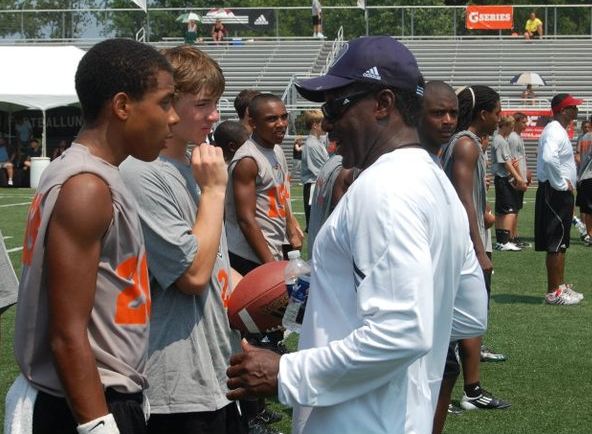One way to spot a good youth sports coach is that he teaches, models, and demands respectful behavior, fairness and good sportsmanship.
Teaching sportsmanship
-
Coaches of 9- to 15-year old athletes in a 2005 study by three midwestern universities indicated a very high level of agreement with the statement, "Teaching sportsmanship is a major part of a coach's job."
-
They also agreed strongly with the statement, "Coaches have a responsibility to help members of their team become better people, not just better athletes."
-
Moreover, every coach indicated that they talked with their players about the importance of being a good sport, three out of four saying they did so frequently. The data suggests that there is a "strong desire by the parents and coaches to teach positive sports behaviors."
The problem is that too many coaches are doing a miserable job of actually teaching sportsmanship and moral reasoning. As Michael Josephson, head of the Josephson Institute of Ethics, notes, "Too many youngsters are confused about the meaning of fair play and sportsmanship and ... have no concept of honorable competition. As a result they engage in illegal conduct and employ doubtful gamesmanship techniques to gain a competitive advantage."

The winning-is-everything philosophy of youth sports is a major reason why children are thought to have such low moral reasoning abilities: in an environment in which winning is paramount, children internalize the value that it is acceptable to do anything to win, even if it means cheating, bullying teammates, breaking the rules, intentionally injuring an opponent, or faking an injury to get a time out.
While part of the problem may be our culture - a society in which too many professional athletes exhibit poor sportsmanship and in which many athletes practice a form of "situational ethics" or "moral relativism" in which there are no longer any absolute or moral truths and what is ethical behavior depends on the context - coaches, parents, officials and youth sports organizations are obviously not doing a good enough job teaching moral behavior to athletes.
As a society we would not find it acceptable if teachers encouraged their students to cheat on tests. Youth sports should be no different. Existing programs to teach athletes moral ethics and to help coaches to teach moral ethics should be expanded and instituted in every community to teach decision-making, sportsmanship, competitive integrity, inspiring through leadership, justice and competitive responsibility. The programs should include such topics as leadership, fair play, teamwork, respecting opposing players, cheating, consequences, and off-the-field behavior.
Teaching Respectful Behavior
A recent study revealed that there is a high probability on most youth sports teams that one or more of the lesser skilled players will be bullied or teased by a more skilled teammate. Good coaches are alert to the possibility of bullying and proactively seek ways to reduce it. Similarly, a good coach teaches and models respect for the opposing team and game officials.
Unfortunately, some coaches have not been modeling appropriate behavior in their behavior towards officials: more than four in ten admitted in a 2005 study that they had yelled angrily at an official (the athletes said almost half their coaches yelled). Coaches should neither yell at officials nor permit their players to do so.
Modeling good sportsmanship and fairness
One of my sons' soccer coaches, an education advisor to then-Massachusetts Governor William Weld, was suspended for the rest ofthe season after threatening a referee after receiving a red card for dissent.
Unfortunately, his behavior is all too common.
Simply put, there should be a zero tolerance for this kind of behavior. Coaches should be able to accept bad calls by umpires, refs and other sports officials (remember, most of them are volunteers, too) and mistakes by players without a public display of emotion or of dissatisfaction (remember: a coach can display anger or frustration by his body language). A coach who makes things tense by his yelling and shouting creates an atmosphere that is not conducive to learning and having fun.A good youth sport coach models good sportsmanship and fairness by:
- Treating every player (including her own child) the same (e.g. not playing favorites);
- Employing an equal playing time rule (through sixth grade) or a "meaningful minutes" rule through high school sub-varsity;
- Applying team rules to all players, whether the child is a natural athlete and never shows up for practice or a less "talented" player who always shows up for practice;
- Recognizing an obligation to develop the so-called "weaker" players at least as much if not more than stronger ones; and
- Treating officials with respect.
Adapted from the book, Home Team Advantage: The Critical Role of Mothers In Youth Sports (HarperCollins 2006) by Brooke de Lench, Executive Director of MomsTEAM Institute, Founder and Publisher of MomsTeam.com, and Producer/Director/Creator of the PBS documentary, "The Smartest Team: Making High School Football Safer."









